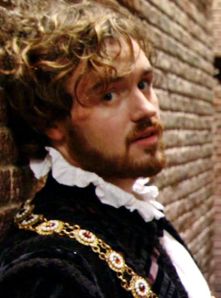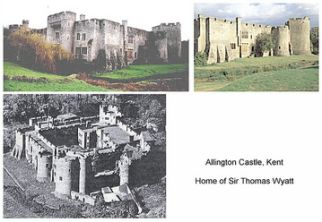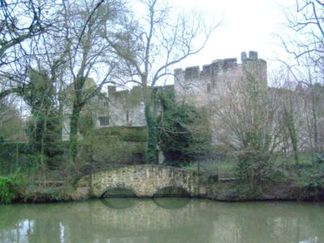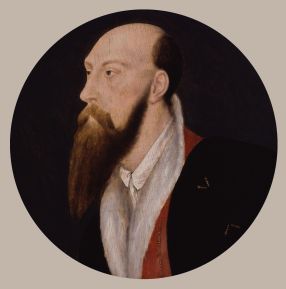Thomas Wyatt Historical Profile
Jump to navigation
Jump to search
The History of Sir Thomas Wyatt the Elder born c. 1503 - died 1542 ( aged 39) Father of English Poetry Click EasyEdit to update this page! (Don't see the EasyEdit button above? <a href="../#signin" target="_self">Sign in</a> or <a href="../accountnew" target="_self">Sign up</a>.) | 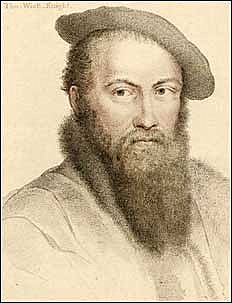 |
INTERESTING FACTS:
| 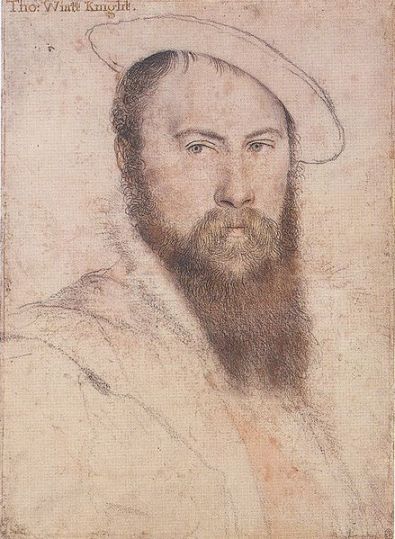 Drawing of Wyatt by Hans Holbein the younger In a story told by George Wyatt, his grandfather Thomas Wyatt was entertaining Anne Boleyn with his poetry while she did needlework. Wyatt noticed a jewel hanging from Anne’s pocket and playfully snatched it off her and decided to keep it as a trophy. Some time later, Wyatt was playing bowls with the King, the two of them arguing over a shot. Wyatt declared that the shot was his but the King declared “Wyatt, I tell thee it is mine”, pointing to the wood with the finger on which he was wearing Anne’s ring. Wyatt, seeing Anne’s ring, replied, “If it may like your majesty to give me leave to measure it, I hope it will be mine”, and then took Anne’s jewel from around his neck and began to measure the cast with its ribbon. The King was furious when he saw Anne’s jewel. He broke up the game and then went in search of Anne for an explanation. ~ <a class="external" href="http://www.amazon.com/gp/product/1848684304?ie=UTF8&tag=theancom-20&linkCode=as2&camp=1789&creative=9325&creativeASIN=1848684304" rel="nofollow" target="_blank">The Early Loves of Anne Boleyn</a> by Josephine Wilkinson |
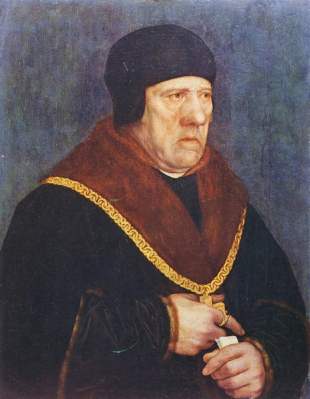 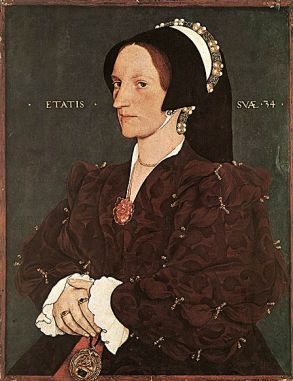 Margaret Wyatt (a.k.a. "Lady Lee") was sister of Sir Thomas Wyatt the poet. Since Margaret and Thomas grew up at Allington Castle, near Hever Castle, it was assumed they were childhood friends of Anne Boleyn. | Sir Thomas Wyatt was the son of Sir Henry Wyatt, Knight (pic at left) As a young man Henry Wyatt had attended Eton, where he established a relationship with Henry Tudor. Both boys were born during the War of the Roses. Henry Tudor was forced to spend most of those years in exile. For two years Henry Wyatt endured the rack and other tortures at the hands of the infamous Richard III (See also: Ancestors of the King) - but he remained steadfast in his loyalty to Henry Tudor. Richard III complained that his own men didn't demonstrate such devotion. There is even a Wyatt family legend about a "caterer cat". Henry was cold and starving in his cell. He "made much" of a cat that slipped through the bars to visit him; she returned his love (and saved his life) by bringing him pigeons, which were cooked for him by a friendly jailer. Henry Tudor remembered his friend when he ultimately conquered Richard; Henry VII told Henry Wyatt "study to serve me and I'll study to serve you!" Which is exactly what happened. Henry Wyatt served faithfully and was richly rewarded, which helped him purchase his beloved Allington Castle; Henry VII even had him act as guardian to Prince Henry. When the king died, Henry VIII had Henry Wyatt knighted at his coronation. They say all of Sir Henry Wyatt's paintings included the cat and the legend is inscribed on his tombstone. He lived 80 years, which was an incredibly long life in those days. Sir Henry Wyatt's son Sir Thomas the Poet and his daughter Margaret (a.k.a. Lady Lee) were assumed to be childhood friends of Anne Boleyn, since Allington and Hever were fairly close. |
| Allington Castle in Kent which is now a convent and closed to the public. | Allington Castle, Kent -The Wyatt Family home just 20 miles from the Boleyn Home of Hever Castle in Kent |
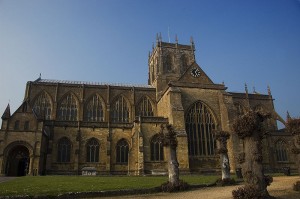 Sir Thomas Wyatt the Elder was laid to rest at Sherborne Abbey where his plain tomb can be found in the Wykenham Chapel of the Abbey. | After story: On 5 May 1536 Wyatt was arrested on suspicion of treason with Anne Boleyn & the other 5 men. He was bound and fettered and marched to the Tower, by Archers of the King's Boldyguard, "No one dare say a word for him". When arrested Wyatt replied "the King well knows what I told him before he was married". Cromwell wrote to Wyatt's father on 11 May that his life was to be spared. No legal proceedings were taken against him, and he was released on 14 June, 1536. Wyatt however had not forfeited the king's favour, and Cromwell still treated him with marked confidence. In October 1536 he was given a command against the rebels in Lincolnshire in the 'Pilgrimage of the Grace', and he was knighted on 18 Mar 1536/7. In 1537 he became sheriff of Kent. In April of the same year he was appointed Ambassador to the Emperor Charles V, and he remained abroad, mostly in Spain, till Apr 1539. After Cromwell's demise he was arrested again and sent to the Tower for making disprespectful utterances about the King to the Spanish Ambassador. Katherine Howard interceded and he was released. Her mother was a Culpepper , friend and neighbour of Wyatt’s of Kent; "on condition that he take back his wife from whom he had been separated fifteen years". He had been separated from his wife for upwards of fifteen years. Wyatt had cast her away on account of adultery, and had not seen her for many years; he was now obliged to receive her, and should he not do so, and not lead a conjugal life with her, or should he be found to keep up adulterous relations with one or two other ladies that he has since lived with, he is to suffer pain of death and confiscation of property. Notwithstanding, Wyatt retired to Allington; Elizabeth Darrell, Lady Poynings, Wyatt’s son and daughter-in-law; were also there. He was made high steward of the manor of Maidstone, and early in 1542 he was sent to Falmouth to conduct the Imperial Ambassador to London. The heat of the weather and the fatigue of the journey brought on a violent fever, which compelled him to halt at Sherborne in Dorset. There Wyatt died at the age of 39, and on 11 October, 1542 he was buried in the great church of Sherborne |
| LINKS: | LITERATURE: Non-fiction
|
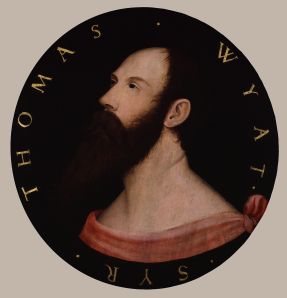 Thomas Wyatt the younger Thomas Wyatt the youngerby Hans Holbein Ca. 1530-40 | Thomas Wyatt the younger by Hans Holbein Ca. 1540-42 |
